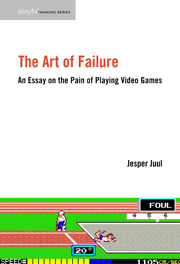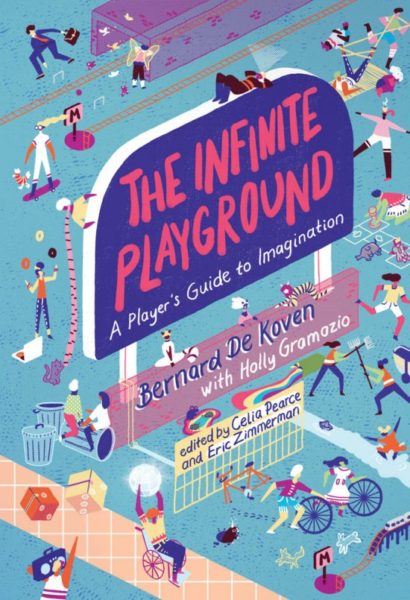There’s a new Humble Bundle with MIT Press Video Game Books, featuring three of my books, many books from our Playful Thinking series, and from Platform Studies.
https://www.humblebundle.com/books/inside-gaming-mit-press-books 


My name is Jesper Juul, and I am a Ludologist [researcher of the design, meaning, culture, and politics of games]. This is my blog on game research and other important things.
There’s a new Humble Bundle with MIT Press Video Game Books, featuring three of my books, many books from our Playful Thinking series, and from Platform Studies.
https://www.humblebundle.com/books/inside-gaming-mit-press-books 


TL;DR; I used to meet resistance to the idea that video game rules (usually expressed in the programming) and algorithms can be meaningful or important. I discuss four ways game rules can create meaning and/or have political implications.
When I first started writing about video games, the humanities (full disclosure: I am a humanities scholar) were probably at the peak of self-importance, and many of the theories we were taught were presented as timeless and universal for explaining all of human culture for all time. It wasn’t really on the table that these theories should be augmented with anything specific going on in, say, video games, or in anything else, new or old.
When I then excitedly tried to argue that the rules of video games could also be central to the game’s attraction and to their meaning, and should be included in the humanities, this came across as boring, nerdy tech stuff that many people couldn’t believe had any importance, and felt about as relevant to them as the construction of printer drivers.

I realized the other day that it’s been years since I had this experience of someone dismissing game rules as irrelevant or meaningless, and I think there is a reason: Our world is now so completely enmeshed in algorithms and in issues of algorithmic bias, that it’s now a given that rules, algorithms, and programming fundamentally matter.
In many ways, of course, but I can see that I have thought mostly about four ways that rules matter.
New and popular culture is often dismissed as “meaningless”, and video games have been dismissed this way along with (say) jazz and romance novels. How then to explain why we find video games meaningful?
A central early and influential example is Gonzalo Frasca’s game September 12th, which at first gives the impression of being a kill-the-terrorists-and-you’re-done game, but once you play, the game reveals how killing breeds resentment and perpetuates a cycle of violence. This made September 12th an influential early example of how the rule system of a game could be expressive, and here express a political point about the counter-productiveness of the War on Terror.
Obviously, most games combine some kind of fictional world with a rule-based system. In the September 12th case, the genre expectations set up by the fiction & visual representation is undercut by the rule system, and we are as players forced to reconsider the actions we are performing in-game. What we think of as meaning is usually a combination of rules, fiction, but also social context, style, and so on.
When I was writing about casual games (A Casual Revolution), it became clear that two of the primary barriers that prevented people for playing video games were:
These were examples of how game rules strongly include or exclude players, depending on their life circumstances, tastes, and video game experience. Design very concretely matters for who is going to play.
I also looked at (The Art of Failure) how failure in a game concretely has implications for our self-image, and how its meaning is tied both to the fictional world, to our identity, and to the social context we are playing in.
This is also where game design observations interface with education. You can design a game, or a test, in ways that encourage or discourage those who fail.
Finally, I think gamification and algorithmic bias overlap. Gamification sets up measures for what we are supposed to do – such as approve the most loans, pass the most students, publish the most papers, be most active on social media. In all cases, what is measured and rewarded is usually not quite what we actually think of as valuable. Publishing more papers is not actually valuable, but we have just set up incentive structures that reward it, and punish those who work for a long time on one paper.
As the gamification term suggests, I suppose, these are typical game design decisions, where we set up rule systems that reward – or punish – certain behaviors.
This problem overlaps quite closely with algorithmic bias: By now, we all have firsthand experience with how algorithms select which posts to feature in newsfeeds, and I think most people understand that AI technologies are both invisible to us, often promoted as objective by companies, while in fact of course they embody lots of biases (here is a bit of a reading list) in gender, ethnic, racial, and class[i] in health[ii] [iii], image recognition[iv], loan approvals[v], policing[vi], to give some examples.
This not to say that video game studies invented the study of algorithms, but the study of games helped bring this hitherto technical domain to the humanities, and it is much easier to discuss game rules now that public discourse so often touches on algorithms.
To sum up, we can think about how the (political) meaning of video games can arise in many different ways, and we can think about this works slightly differently for rules and for fiction (narrative):
Rules interface with the world literally: what happens in a game really does happen. If you lose a game, or if the rule structures makes a game inaccessible to a large portion of the population because it is too difficult, requires too much time, or makes too many assumptions about the audience, that really does happen.
Fiction (~narrative) interfaces with the world metaphorically: what happens in a fiction does not actually happen. This does not make it less culturally important; it just means that we (often) see fiction and narratives as questions of representation and values.
For your theoretical traversal: Transactions of the Digital Games Research Association (ToDiGRA) special issue on “Teaching Games: Pedagogical Approaches”
|
Clara Fernández-Vara
|
|
Jeff Watson
|
|
Mirjam Palosaari Eladhari, Hartmut Koenitz
|
|
Christoffer Mitch C. Cerda
|
|
Hartmut Koenitz, Mirjam Palosaari Eladhari
|
|
Seth Andrew Hudson
|
|
Hartmut Koenitz, Christian Roth, Teun Dubbelman
|
|
René Glas, Jasper van Vught, Stefan Werning
|
Yes, Game Studies issue 21/1 is out. The rumors are true, this is the 20th anniversary issue.
Without going overboard reminiscing, I’ll just say I think our major goals were achieved, and that it’s fine how Game Studies is just one journal among many now. I think we helped:
One thing I have learned since is that history is basically a game of telephone, often a heavily mythologized one. Thus I don’t want to overstate our centrality – many people were studying video games and thinking about publication channels back then and before. And to counter the erasure that the game of mythologizing telephone creates, let me just list and thank all the people who were in the original group when I was most involved in the journal: Espen Aarseth, Markku Eskelinen, Marie-Laure Ryan, Susana Tosca, Gonzalo Frasca, Anja Rau, Aki Järvinen, Lisbeth Klastrup, Torill Mortensen, Jill Walker.
******
by Espen Aarseth
This issue of Game Studies marks the 20th anniversary of the journal.[more]
by Marco Caracciolo
This article discusses a recent strand of videogames that foreground disruptive animal characters in an urban environment. I link this “animal mayhem” to recent debates on the nonhuman, showing that videogames like Goat Simulator and Untitled Goose Game (my case studies) evoke the inherent strangeness of human-nonhuman connectedness.[more]
by Filip Jankowski
This article attempts to suggest a revision of the historical aesthetic category frequently called the “French Touch.” The article focuses on games that matched the contestataire moment in the history of France from three development circles (Froggy Software, Cobra Soft and François Coulon), arguing that they escape this traditional categorization.[more]
by Emma Reay
This paper examines representations of children in contemporary video games through content analysis. Using a sample of over 500 games published between 2009 and 2019, it identifies the dominant functions of child characters and documents patterns of representation across genres and over time.[more]
by Martin Ricksand
This article analyzes speedruns, the practice of beating a game as fast as possible. The article applies theories from the philosophy of sport as well as the philosophy of fiction, and outlines a way of how to adjudicate on what strategies may be employed in different kinds of speedruns.[more]
“Actual history doesn’t take place”: Digital Gaming, Accuracy and Authenticityby Eve Stirling, Jamie Wood
This paper examines university students’ perceptions of how playing historical videogames has affected their understanding of the past. It focuses on how active engagement in gameplay affects perceptions of historical time and sense of place, in particular the relative importance of accuracy and authenticity.[more]
by Agata Waszkiewicz, Mateusz Kominiarczuk
The article proposes a model of objective-based reward systems based on Gary Alan Fine’s frame analysis and Jesper Juul’s goal typology. The model reconceptualizes various reward-bound goals commonly encompassed under the categories “quests” and “achievements” in order to show them as non-homogenous and yet not dissimilar.[more]
by Martin Roth
Who Are You? Nintendo’s Game Boy Advance Platform (2020) by Alex Custodio. Cambridge, Massachusetts & London: MIT Press. ISBN: 9780262044394. pp. 280.[more]
by John Sharp
Transnational Play: Piracy, Urban Art, and Mobile Games (2020) by Anne-Marie Schleiner. Baltimore, Maryland: Project MUSE. ISBN: 9789048543946. pp. 182.[more]
For your theoretical traversal, Game Studies volume 20, issue 4.
Assessing Toxic Behaviour in Dead by Daylight : Perceptions and Factors of Toxicity According to the Game’s Official Subreddit Contributors
by Patrick Deslauriers, Laura Iseut Lafrance St-Martin, Maude Bonenfant
This article identifies 5 key aggravating factors that may lead to toxic in-game interactions according to players’ perception. We studied the Dead by Daylight community using a content analysis of players’ conversations on the game’s official subreddit to help us better understand how they perceive potentially toxic behaviour inside of the game.[more]
Dungeon Pirates of the Postcolonial Seas. Domination, Necropolitics, Subsumption and Critical Play in Pillars of Eternity 2: Deadfire
by Mateusz Felczak
This article is a close reading of a cRPG directly approaching the topic of colonialism in the fantasy setting. Its main goal is to present a framework inspired by the ideas of Achille Mbembe to assess the difficulties in applying potential elements of critical play that would transfer from the narrative into the game’s mechanics.[more]
Negotiating Textures of Digital Play: Gameplay and the Production of Space
by Justyna Janik
This paper analyzes the mechanisms of communication connecting different types of actant during the moment of digital gameplay. Gameplay is here interpreted in the context of Lefebvre’s concept of texture, developing a view of gameplay as a performative and communicative experience.[more]
Grades on Games: Gaming Preferences and Weekly Studying on College GPAs
by Kelsey Prena, Andrew J. Weaver
This study surveys college undergraduates to explore patterns across gaming, studying, and academic performance. Time studying on the weekends (positive), gender, and preferences for action games (negative) were significant predictors of academic performance. These results and complimentary results are discussed.[more]
Like Seeing Yourself in the Mirror? Solitary Role-Play as Performance and Pretend Play
by Jaakko Stenros, Tanja Sihvonen
This article analyzes the single-player digital role-playing game as performance and pretend play through character creation, character interaction, and game mechanics. These games are positioned as toys that are “pretend-played” with expectations. Players’ extended “pretend play” is conceptualized and analyzed as queering.[more]
Player customization, competence and team discourse: exploring player identity (co)construction in Counter-Strike: Global Offensive
by Matilda Ståhl, Fredrik Rusk
This ethnographic study explores a participant’s perspective on local player identity (co)construction in Counter Strike: Global Offensive (CS:GO). Although there are individual variances, the identities (co)constructed orient towards a perceived competent player identity shaped by technomasculine norms in online game culture.[more]
From Dead-end to Cutting Edge: Using FMV Design Patterns to Jumpstart a Video Revival
by Carl Therrien, Cindy Poremba, Jean-Charles Ray
This paper argues that design patterns from full motion videogames are a useful source of design knowledge that can scaffold the development of new works. It presents results from a historical analysis of over ninety games using live-action full motion video. Methods for re-integrating this knowledge back into the design process are explored.[more]
(Re)Mastering Dark Souls
by Timothy Welsh
This paper argues that the aesthetic experience of playing Dark Souls changes over time as the player community shares its collective mastery of the game. It analyses how late-stage player practices often replace exploration and discovery with efficiency and productivity. In conclusion it raises the need for a historically situated poetics of play.[more]
Shira Chess, Play Like a Feminist.
by Esther MacCallum-Stewart
Play like a Feminist. (2020) by Shira Chess. Cambridge, Massachusetts: MIT Press. ISBN: 9780262044387. 184 pp.[more]
For your theoretical consideration: Game Studies volume 20, issue 3.
“Elves are Jews with Pointy Ears and Gay Magic”: White Nationalist Readings of The Elder Scrolls V: Skyrim
by Kristian A. Bjørkelo
This article explores how White Nationalists on Stormfront interpret (decode) Skyrim in accordance with their own worldview and the affordances of the game. In their eyes the Nords are a Germanic people and “Elves are Jews with pointy ears and gay magic”.[more]
A Typology of Imperative Game Goals
by Michael S. Debus, José P. Zagal, Rogelio E. Cardona-Rivera
This paper presents a typology of game goals to fill a gap in the literature regarding kinds of goals in games and how they are interrelated. We focus on ludic goals, instead of player created or narrative goals. The typology can be used for describing goal structures, how higher-level goals relate to lower levels and analyzing a games’ design.[more]
Sorry, Wrong Apocalypse: Horizon Zero Dawn, Heaven’s Vault, and the Ecocritical Videogame
by Megan Condis
This article is an examination of the ecocritical potential of Horizon Zero Dawn (Guerilla Games, 2017) and Heaven’s Vault (inkle, 2019). I argue that to properly depict climate change, we must develop new narrative formats and game mechanics that showcase “slow violence” (Nixon 2011).[more]
Lara Croft, the heroine of the popular Tomb Raider videogame series, has undergone a major transformation after the series reboot 2013. The new representation of Lara Croft is a clear departure from the postfeminist action heroine archetype and is replicated in other post-2013 videogames with female protagonists.[more]
This paper argues for applying corpus linguistics to videogames; a method that can reveal textual patterns in a corpus of games. This method is applied to gender representation in an example corpus, offering quantitative analysis of how discourses around social identities are (re)produced.[more]
by Jeremiah McCall
Historical games present the past in terms of historical problem spaces: player agents with roles and goals that are contextualized in a virtual world whose features enable and constrain player action. The HPS framework helps us better understand the gamic medium of history, with utility for historical game scholars, educators, and game designers.[more]
by Liam Mitchell
While Bernard Suits’s landmark book The Grasshopper is as playful as it is rigorous, scholars in game studies tend to reference it only for its apparently bloodless definition of gameplay. This paper responds to this reception by highlighting the productive ambiguities of the text, particularly the relationship between games and society.[more]
by M. D. Schmalzer
This article develops the concept of janky controls to disrupt the assumed cybernetic connection of player and game. Through this disruption, standard notions of player subjectivity is also disrupted allowing for more diverse players and videogame design practices.[more]
Rob Alvarez Bucholska was kind enough to interview me for his Professor Game podcast.
The conversation touches on a lot of things I don’t usually talk about, like writing method, game design methods, and the relation between game-making and theory. I hope you enjoy it.
Direct link here.
 I am happy to announce that Bernie De Koven’s final book is now out, courtesy of Holly Gramazio, Celia Pearce, and Eric Zimmerman. I contributed a small essay about what it was like to play with Bernie.
I am happy to announce that Bernie De Koven’s final book is now out, courtesy of Holly Gramazio, Celia Pearce, and Eric Zimmerman. I contributed a small essay about what it was like to play with Bernie.
The Infinite Playground is available from MIT Press and elsewhere.
https://mitpress.mit.edu/books/infinite-playground
It used to be hard to make the argument about rules; it is much easier to explain now, because of our daily exposure to algorithms, and because of the ongoing discussions of the meaning and biases of algorithms. The renewed focus on accessibility also means that game developers take their commitments towards the audience more seriously: Think about a game like Gris where you cannot fail, or Celeste, where players can choose whether the game should be an extremely challenging platform game or a forgiving experience. Today it would be decidedly strange for someone to deny that games rules can create meaning, or to dismiss rules and algorithms as unimportant or without concrete and political implications.
My simple hope, then, is that to continue to study games, including their rule systems, is helpful for expressing ideas, thinking about accessibility, and looking at problems of gamification and algorithmic bias. In short, helpful for building algorithmic literacy, and for understanding our algorithm-driven world.
Some Literature
[i] Sara Wachter-Boettcher, Technically Wrong: Sexist Apps, Biased Algorithms, and Other Threats of Toxic Tech, 1 edition (W. W. Norton & Company, 2018).
[ii] Ziad Obermeyer et al., “Dissecting Racial Bias in an Algorithm Used to Manage the Health of Populations,” Science 366, no. 6464 (October 25, 2019): 447–53, https://doi.org/10.1126/science.aax2342.
[iii] Christina Oxholm et al., “Attitudes of Patients and Health Professionals Regarding Screening Algorithms: Qualitative Study,” JMIR Formative Research 5, no. 8 (August 9, 2021): e17971, https://doi.org/10.2196/17971.
[iv] Carsten Schwemmer et al., “Diagnosing Gender Bias in Image Recognition Systems:,” Socius, November 11, 2020, https://doi.org/10.1177/2378023120967171.
[v] Emmanuel Martinez and Lauren Kirchner, “The Secret Bias Hidden in Mortgage-Approval Algorithms – The Markup,” August 25, 2021, https://themarkup.org/denied/2021/08/25/the-secret-bias-hidden-in-mortgage-approval-algorithms.
[vi] Virginia Eubanks, Automating Inequality: How High-Tech Tools Profile, Police, and Punish the Poor (St. Martin’s Press, 2018).